Facebook’s Inevitability
If Mark Zuckerberg hadn't invented Facebook someone else would have. Probably within a month or two of his invention.
Ezra Klein reviews “The Social Network,” the hot new film about Facebook founder Mark Zuckerberg, and makes an astute point:
[T]he movie recasts a story of essentially inevitable technological change as the story of a socially inept genius and two or three of his most important relationships. That makes for a better film, of course. But for another perspective, it’s worth reading Chris Beam’s eulogy for Connect U, the version of Facebook that began at Columbia. Mark Zuckerberg programmed his version over a few months. Adam Goldberg, the creator of Connect U, created his over a summer. According to Beam, it was more advanced than Facebook, even if it did lack the elegant minimalism of Zuckerberg’s design.
At the same time, of course, Friendster, MySpace, Orkut, and a variety of other social networking platforms were swirling about. After all, technological advances had made these things simple enough that even college students could pull them together in a few weeks. If it hadn’t been Zuckerberg, it would’ve been someone else. Maybe Goldberg.
This is a rather common phenomenon: It’s called “simultaneous invention,” and it happens all the time: Technology advances to the point that the next step is obvious to multiple people, and so they all take the next step at approximately the same time. In the end, one of them gets the patent, or the market share, and so squeezes the other out and becomes synonymous with the invention. That’s what happened with Alexander Graham Bell, who in all likelihood invented the telephone after Elisha Gray — and both of them came after Antonio Meucci.
[…]
[T]he difference between Mark Zuckerberg and Adam Goldberg was very small, while the difference between Mark Zuckerberg and the smartest college kid in 1999 was huge. It was the advancing storehouse of human knowledge, not the advancing capabilities of particular humans, that made up the difference.
Emphases mine. The point isn’t to take anything away from Zuckerberg and others who invent The Next Great Thing. Indeed, the fact that dozens of geniuses were working on the same concept simultaneously actually makes their coming up with the version that caught on more remarkable. But it’s worth remembering that today’s geniuses have access to geometrically expanding reserves of knowledge created by yesterday’s.
It’s also worth noting that we do the same thing with politics, assigning far too much credit and blame for how things turned out to sitting presidents, governors, mayors, and so forth when, in fact, they were highly constrained by their institutions, circumstances, and surrounding actors. The natural human tendency to personalize large scale phenomenon simply clouds our perceptions.
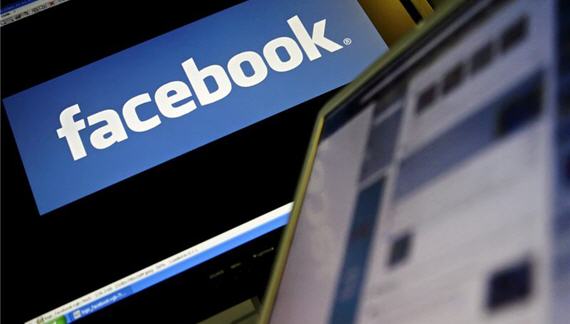

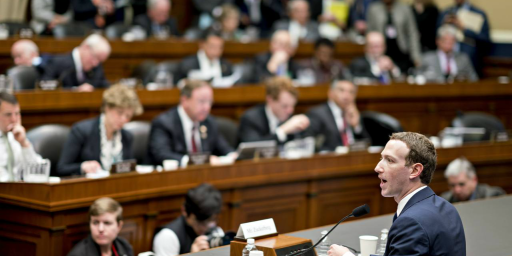
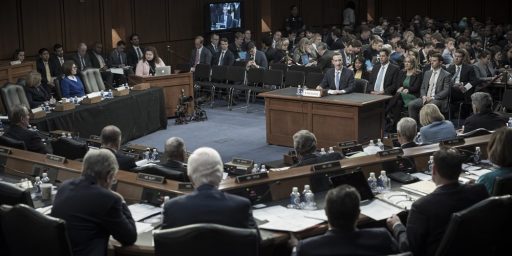
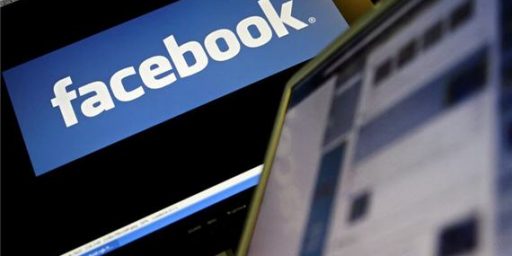
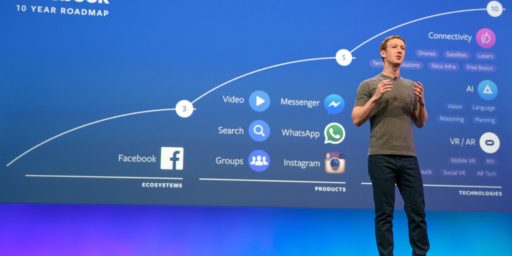
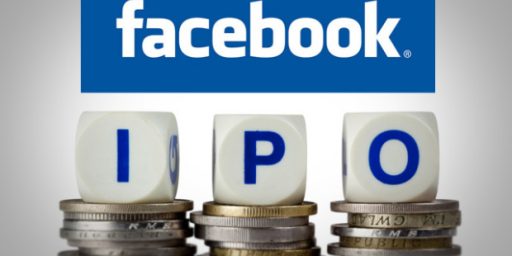
On the velocity of change…somebody today, Sully I think, reffed something by Chris Hayes, and the prompted me to go and look for Chris’s blog. When I found it, at http://www.chrishayes.org/blog/, the last entry from February 26, 2009, says
There is sometimes genius in these developments, but the genius is usually not the person most associated with it. That’s because by the time these things can become commercialized and hit it big, it’s already pretty obvious.
So, is Zuckerberg “too” rich, in any sense? Well, I would say that it’s an extreme case where income inequailty is magnified by technology.
It’s likely true that Zuckerberg benefited disproportionately from the work of others who got next to nothing for their contributions. But I’m not sure how to remedy that from a public policy stance, or even whether we should try. Especially since the likely impulse would just be to confiscate a large chunk of his money and give it to people who had zero to do with Facebook’s success.
One of those occasions when Determinism is probably appropriate. A bit like the light bulb which was invented at around the same time by Edison and Swan although Edison generally gets most of the credit. There’s some merit in your comments as they relate to politics (the unreality is surreal) but at the same time one should be beware of too closely embracing Determinism. A lot of outcomes have a lot to do with individuals.
Speaking for myself, it makes programming less exciting. People are more obviously working on everything already. In say 1982 it was easier to think your idea was unique.
Another example of the Justin Timberlake effect.
Oh, individuals remain important. Personalities and whatnot matter in politics and, certainly, genius matters in invention. And there’s a reason that the other dozen or so competing social networks that were similar to Facebook didn’t take off and Facebook did. But we’d have doubtless arrived at a friendly interface soon enough.
The kid’s obviously talented, although not enough so — to me, anyway — to justify his superstardom. But, again, if Timberlake didn’t get the money he was generating, someone would. So why not him?
Of course, he does have that boot fortune to fall back on.
Don’t assume “best” products win, James. In my experience a product only has to hit the ballpark in terms of functionality, and then it is marketing and/or network effects. I’ve seen companies make a good living with a product that is roughly equivalent to a free alternative. It’s just that the free alternative doesn’t have a sales force. Generally, selling something that hits that ballpark works.
(I don’t think anyone here is uniformly secure that “best” candidates win all the time either.)
The Effect is named for the recognition that “why him?” has a randomness component. “Why not him?” doesn’t quite communicate that network reality, information cascades, etc.
That’s doubtless true. But, certainly, Facebook did something that Friendster, MySpace, Orkut, and others didn’t. I tried all of those, I think, and found them useless. Facebook, too, for that matter but that’s a function of scale.
Right. My only point is that Timberlake is generating a lot of money and if he didn’t get it someone else would. Why are they more entitled to the money generated from his talent than he is?
It’s doubtless true that there are a lot of enormously talented singers, actors, and whatnot who can’t make a living and have to get normal jobs instead. Not sure what to do about that, let alone why it’s Timberlake’s responsibility.
“So, is Zuckerberg “too” rich, in any sense?”
Zuckerberg hasn’t totally cashed out yet.
Remember when AOL was the hot company?
Exactly ponce…
It gives us all a strategy. We should give ourselves some exposure to network effects. We may not hit it, but as God said to the guy who prayed ever week to win the lottery .. “meet me halfway, buy a ticket.”
It seems more likely than not that something would have come along and consolidated everything, but it’s not as clear that it was imminent. Klein throws the fact that Facebook was simpler than College U as a tangential, but Facebook’s simplicity was rather key to its success. Facebook didn’t discover something new, but it did develop something simple and pleasant enough to appeal to a wide variety of audiences. This is where MySpace came up short. It’s not particularly clear to me that it wouldn’t have taken some time for someone to come up with something similar to Facebook in terms of simplicity and expandability. It walked a pretty fine line that was the path to success. That’s no small thing.
“Steven Johnson and Kevin Kelly both have provocative new books out. Steven’s is Where Good Ideas Come From: The Natural History of Innovation while Kevin’s is titled “What Technology Wants.” Wired sat them both down for a conversation.” Link.
Kelly supports the group-mind viewpoint.
I thought a big part of Facebook’s success was that it was initially limited to students. That gave it a desirable veneer of exclusivity. It wasn’t open to all, so if you were in the in crowd, you felt special. It’s sort of like how Gmail started as an invitation-only thing. If anybody off the street can get something, it’s less appealing. If it’s constrained, people want it more. Then once it takes off, you open the floodgates. Good strategy.